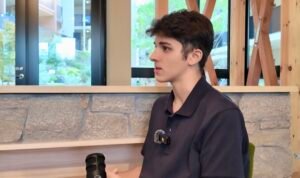In this podcast interview, Mike Spencer, founding Headmaster of Malvern College Tokyo, shares insights about this prestigious British international school’s first year of operation. With nearly three decades of international teaching experience across Hong Kong, New Delhi, Shanghai, and Mozambique, Spencer brings a wealth of global education expertise to Tokyo. The school, which opened in 2022, uniquely launched with both primary and partial secondary programs, setting itself apart from typical international school startups.
Malvern College Tokyo stands out because it mixes its British roots with Japanese culture. The school uses a classic house system, dividing students and teachers into six groups. This setup creates a close-knit community where everyone feels like family. It encourages students of different ages to interact and learn from each other.
The school isn’t just about getting good grades; it also focuses on looking after students’ personal growth. Malvern pushes for qualities like entrepreneurship and character development, right alongside regular school subjects. Starting with 150 students in its first year, the school has now doubled in size to about 300 students in the second year, showing that its British-style education works well in Japan.
Transcript
0:00
You mentioned the house system and I think that’s something that, if a parent would research a bit about your school, that would pop up rather easily, so we do know that the students are broken up into houses which, pardon the comparison, it’s very Harry Potter-like but, perhaps you can explain to us how that works and how does it benefit kids.
0:25
[Music]
0:35
Welcome to International School Times Global we are here with Mike Spencer, founding Headmaster of Malvern College
0:41
Welcome Mike thank you good morning good morning first I’d like to know a bit
0:47
about you and your journey here to Japan also
0:53
what what made you want to or start this mission on starting a new
0:58
school here in Tokyo yeah well thank you I I guess the answer to that
1:04
question’s potentially quite long um I guess I started in International
1:09
Education back in 1995 I graduated from the UK and I
1:14
worked in a couple of schools in the UK but it had always been an aspiration to work and teach overseas and I think that
1:23
aspiration came probably from the fact that my father was pretty mobile as a
1:28
as a naval officer and we spent some time living in Africa when I was young
1:34
and I think it sold the travel bug and so I guess as soon as I could really
1:40
my wife and I relocated from the UK um my first teaching job overseas was in
1:46
Hong Kong where I stayed for 13 years and um one of my daughters was made in
1:52
Hong Kong okay and that that was which that was what year that was in
1:58
in 90 she was born in 8 and yes absolutely so it was it was it was
2:04
a great time for us and we stayed in Hong Kong for about 13 years and worked in a couple of schools there a great
2:11
place for children to grow up so but we didn’t want that to be all that our
2:17
daughters has experienced so um we then headed off to New Deli which was
2:23
certainly a big change from Hong Kong and I was fortunate enough there to to
2:28
to join the British School in New Delhi as the as the head of primary and stayed there for four or five years uh
2:36
as a wonderful experience um but then moved back to Shanghai to a an international
2:43
Chinese School um which was bilingual and worked there for four and a half
2:50
years that was a fascinating experience so the Hong Kong peace the Shanghai peace I’ve always had an
2:58
affinity for this sort of area I suppose of the of the world but then after that
3:03
went off to mosambi from Shanghai Mozambique in subsaharan Africa to help
3:11
start up a a school or establish a school there for the agakhan development
3:17
network very different catchment as you can imagine very but it was it was
3:22
it was a startup we were there during covid and
3:31
as a result of that really it was a residential school and a residential school during covid was pretty tough uh
3:38
to be honest um but we decided then as a family to come back to the UK take a few
3:44
months off and just recalibrate and think about what we what we wanted to do
3:50
uh and with that Southeast Asian experience Shanghai Hong Kong
3:57
experience of a startup it was when the opportunity to start up a
4:03
school like Morin College came up in a region that I was familiar with
4:10
with some startup experience all the stars seem to align and it seemed
4:15
like a wonderful opportunity and it’s been a really exciting project and
4:22
one that I I’m very proud of and very proud to have been part of actually so
4:28
uh so I I arrived in Japan um in
4:33
2022 that’s right 2022 and for a year before the school opened we were based
4:40
in an office out in Shinjuku and I think I’m employee
4:46
001 but there were other people on board okay at a similar time yeah well
4:53
that’s so if my math is correct would that that makes 34 35 years inter
4:59
naal teaching um about 29 I left in ’95 so yeah but it’s been a long it’s been a
5:05
long and very fascinating journey and you know to bring up your own family in all of those different places as as you
5:13
know I think the biggest sacrifice you make is family you know your your parents and your wider family and the
5:20
cousins and and things like that but I think the opportunities we’ve had as
5:26
quite you know a small family to travel
5:32
around the world has just been fantastic and I think internationally mobile families always have fantastic
5:38
experiences and we’ve certainly had that and once again you find yourself
5:43
again in a startup situation yes um this um I think I can count on my hands the
5:51
number of international schools in the last 20 30 years that have started in
5:57
the Tokyo area so this is Quite a feat um also some of the schools that I have
6:03
seen start up they tend to start with maybe grade one grade two but not you uh
6:10
you chose to not just start with the entire primary school but you even started with some of your secondary as
6:17
well what was the thinking about such a ambitious goal yeah well you know
6:23
certainly we wanted to make sure that we didn’t open up for the full age range
6:28
because obviously we want to make sure that our oldest students have a good Runway to pre-university education um but you you
6:37
will be familiar with the campus it’s an immense campus and if we started a year group at a time it would take a
6:44
very long time for us to be able to maximize the use of these wonderful facilities um but yeah we we felt that
6:52
we wanted to open the PYP the international Balor PVP program and
6:59
in order to do that we wanted to put a a unit of inquiry and program of inquiry
7:05
together that covered the full six years we also wanted to start our secondary
7:12
school so that we could have some subject Specialists on the staff very early working with just three-year
7:20
groups but that’s really given them the opportunity to build a curriculum plan
7:25
and a a curriculum framework so now we’re we’re always ready when a new
7:32
year arrives with the curriculum that we need to be in place so I think the
7:37
language elements is also something that’s important many of our our pupils have come to us with varying
7:44
levels of English language and at the end of our IB Program which will be
7:52
taught in English it’s really important that they’ve had the time to acclimatize to learn the language at a level
8:00
that will ensure success so um yeah it’s worked well for us thank you for uh
8:07
bringing that up because I think if I speak to many Headmasters or principles in
8:14
different international schools what I often hear is the challenges of bringing
8:19
um International School Kids within a school especially here in Japan where
8:25
English would be their secondary um secondary language and sometimes even third yes um and so what does malver do
8:35
or aspire to do to bring these children into a school english-based
8:42
school and be part of a global Community that’s a really good question
8:47
and it’s a the the language question vexes many international schools wherever they happen to be but we
8:53
have a very strong EAL Department we support English as an additional language we have specialist teachers
9:01
our admissions process we’re very very keen to make sure that we don’t
9:08
accept students for whom we can’t make provision so I guess we assess levels of
9:14
English on entry and ensure that the resources are there to to serve the
9:20
needs of those pupils I would say that for us we’re a
9:26
you know it’s a really interesting mix we’re we we are an international school but we’re certainly very much a British
9:33
independent school too so that mixing of
9:38
British tradition and culture alongside the host culture and the host
9:44
language is is really important that we value and recognize both of those
9:50
elements we have a strong Japanese Department we make sure that our Japanese pupils have the support and in
9:57
fact all of our pupils have the opportunity to learn the local language here and they’ll have four or five
10:03
lessons a week to maintain and perhaps extend the Japanese language but
10:08
we don’t we don’t claim to be a Bilingual School for us it’s really important that we secure really high
10:16
levels of English and we know a lot of research you know tells us that it’s
10:23
pretty easy to pick up basic communication skills in the language in a couple of years but for those those
10:29
students who we want to excel and and have a language level
10:35
that will enable them to succeed at University you have to allow probably
10:41
four or five years for that to happen right and that’s one of the reasons that we haven’t filled up quickly because we
10:48
want to make sure that all of our pupils have developed that level of language that will enable them to be successful
10:55
as they graduate from us into from the de from the diploma program and move on to
11:01
universities I can only imagine that the first year of operation the
11:06
admissions process was very challenging so I think you why don’t you tell us a
11:12
bit about what does a Malvern student what are you looking forward
11:21
for a Malvern student like what would make them successful for entry yeah
11:26
that I think it depends on their age so we have different criteria and assessment protocols for different age
11:33
of students obviously a pupil who arrives fairly late has a shorter Runway
11:39
to learn the language so our expectations of their English language skills would probably be a bit higher
11:45
but for our younger pupils for our very young pupils you know when they’re
11:51
four and five years old it’s always very very difficult to make a prediction as to where
11:58
they’ll be in another 10 years however we’re pretty experienced at
12:06
engaging young pupils in very social situations when we assess them
12:13
because we want to see it’s not just academically how how well they do but we
12:19
want to know that they they can work with others that they’re sociable that
12:24
they enjoy playing that they’re that they’re confident that they’re willing to take a risk or but without
12:34
a doubt when we opened finding finding the pupils that we
12:42
currently have was challenging you’re quite right particularly as we didn’t
12:47
have any teachers on board at that time so we were able to with your help
12:52
I and I know be able to look around and and find people who could come and help us do that and our very first cohort of
13:00
primary pupils I mean we’re delighted with actually I think we’ve done
13:06
something right along the way for older pupils we do some cognitive ability
13:13
testing so if they don’t have high high English skills we’re still able to
13:19
determine that they’re bright and that they’re very capable of learning quickly
13:25
so there are nonverbal reasoning elements to our assessments we want to find out how good pupils are spatially
13:33
and so we do a sort of a a suite of of tests that enable us to assess the
13:39
potential of pupils as well as see what they’re like actually at the point of
13:44
entry I see thank you and and you hinted a little bit about Malvern’s culture
13:52
and roots and history you one of the things is you look around Japan all the
13:57
international schools they all have there unique characteristic something that makes them stand out but it’s taken
14:04
them years to build that Malvern is in a unique place where they come in
14:11
already with this history and this culture what would you describe would
14:17
be the characteristics of a typical modern school and how would you
14:23
say it would stand out among other international schools that’s a great question
14:30
because establishing a brand new school based on the culture and Ethos of
14:36
sister schools in different locations is is
14:41
interesting I would say that for us we’ve been able to draw upon our family
14:47
of schools very very closely we’re we Malvern College UK which was
14:55
established in 1865 and is is going strong and and is a very very successful
15:01
Independent School in the UK is is our is the source of much of our
15:08
culture and vision and mission statements and those vision and mission statements have spread across all of our
15:16
our nine campuses so the wonderful thing about being the newest school is that we
15:22
have eight others that we can draw upon and the expertise and the staff
15:29
and and the startup the startup phase has been gone through many times for
15:37
me Malvern college is is really unique in that it doesn’t
15:43
matter which which one you go into there are some very common features I think
15:51
the family feel of our schools is something that we work very hard to instill we want to make sure that our
15:59
our pupils feel that this is a home from home and the original Malvern college is
16:04
a boarding school so they have the responsibility to look after their
16:10
pupils for 24 hours a day and as a result of that I’ve established some really strong pastoral
16:17
systems and we’ve been able even though we’re a day school to draw on
16:22
some of those best practices by introducing things like house systems
16:28
and certainly have responsibilities for making sure that we know our
16:34
pupils really well and that they’re happy and that they content and we take the the non-academic side of pupil
16:42
life really seriously and I think that that’s not always the case with day schools I would say that there are
16:49
some unique features of all of our schools entrepreneurship it’s something that we’re really Keen to develop
16:57
sometimes people ask what is entrepreneurship it’s not simply just about business and money and finance but
17:06
I would say it’s about encouraging our pupils to be able to add value to their communities being able
17:12
to add value to any situation that they might be in and there’s a whole
17:19
set of skills associated with that which we deliberately embed in our curriculum
17:26
and you know whilst we have very strong academic res they’re easy to measure I think what
17:33
Malvern challenges itself with and does so successfully is looking at all of those areas that aren’t assessed in the
17:39
school you know how do you assess a pupil’s confidence or their
17:45
resilience or their bravery or their courage and we have a series of Malvern
17:52
qualities that we actively consider whenever we prepare a unit of work or
17:59
our curriculum because actually it’s all of those qualities that are going to
18:04
make a pupil successful academically yes they need to they need to cross the line
18:10
in terms of academic results but we’re not just educating our pupils to
18:16
do well in their exams we want the legacy of a Malvern college education to
18:22
serve them well in their future lives and I think that we been able to
18:29
demonstrate that that’s been successful over the over the decades
18:35
and centuries that more College has has been going and our our Legacy of
18:43
of of Nobel Prize winners and very well-known characters particularly in
18:50
the UK is a testament to how important those values and
18:56
characteristics are you mentioned the house system and I
19:02
think that’s something that if a parent would research a bit about your school that would pop up rather easily so
19:10
we do know that the students are broken up into houses which pardon the comparison it’s very Harry Potter like
19:18
but perhaps you can explain to us how that works and how does it benefit kids yes the house system is an
19:25
integral part of all of the Malvern colleges is actually and you’re absolutely right every pupil and every
19:32
teacher and in fact every staff member with the exception of the Headmaster belongs to a house and the wonderful
19:40
thing about that is that every house has within it pupils from age five
19:47
currently up to age 15 and we have six houses
19:54
we our pupils dine in their houses at lunchtimes and so there are mixed age
20:00
groups and groups of teachers who develop a really really strong bond
20:07
throughout their time and they will stay in that same house for the number of years that they happen to be with us it
20:13
could be for 13 years pupils are associated with that that group and it
20:19
enables us to do some wonderful things I mean first of all it enables really strong tutoring it enables pupils who
20:27
have who have who have a need for academic support to turn not just to
20:32
teachers in their year group but to turn to other pupils it enables us to
20:39
compete sometimes across our houses in sports or Arts and it really it
20:46
really is a way of ensuring that while we may have aspirations to grow to a
20:53
thousand pupils our our pupils are always part
20:58
of a smaller Community which feels like a family and which is really supportive
21:03
so yeah it it’s taken a while to build and establish those houses but
21:09
there’s no doubt about it that there’s a real Pride about from the students
21:14
about the houses that they belong to and interestingly the naming of those
21:19
houses is fascinating originally Malvern College was a boy School and so if
21:26
you look at the history of Malvern college and you look at the alumni it
21:32
wasn’t until 92 when we became co-educational that you started to see
21:38
see girls represented more fully and now I’m delighted to say that some of our
21:45
houses are named after you know famous women role models and you know we’ve
21:51
we’ve chosen junko tab so tab is one of our houses and obviously you know the
21:57
first woman to conquer Everest came from Japan and so it seems very fitting that
22:03
in this context we’re adapting our Traditions to suit our context and we
22:11
try to do that all the time but the house system is certainly something that’s embedded well and I would say
22:18
that there are many many opportunities for us to use this particular system for
22:25
pastoral academic and holistic reasons when I talk to Malvern College
22:34
administrators or sometimes yourself as well I I often hear the term pastoral care can you tell me a bit about what
22:42
that term means for you what does it mean for the school yes
22:47
so fundamentally unless a child is happy
22:52
they’re not going to be really switched onto their learning so for us the social and emotion development of our pupils is
23:01
just as important as their academic development and so when we talk about
23:07
pastoral care we’re looking for ways to really look after the well-being of our
23:13
pupils and that may be through a number of of routes actually
23:21
I’ll just divert a little if if you don’t mind and talk a bit about Covid I mean during during Covid many of our pupils
23:29
were were quite isolated they were working from home and it meant that
23:36
they didn’t have the opportunity to develop those social skills of
23:41
interaction and when when they were in school they would very often be wearing a mask and our youngest
23:51
Learners pick up on those facial cues and with everybody’s faces covered a
23:58
lot of those skills were were very difficult to acquire and what we notice now
24:05
actually a couple of years after covid is that there are some year groups that
24:11
were more affected by that than others but through our pastoral care system
24:16
what we’ve been able to do is to look at the social skills or the the shortfall in some of those interpersonal and
24:22
social skills and try and build in activities for our pupils as part of the
24:27
curriculum that help plug that Gap so I guess pastoral care is is making sure that
24:36
pupils pupils well-being is secure enough for learning to be their main
24:44
focus so I like the fact that you brought covid up because I find a lot
24:50
of schools were really tested during that time their infrastructure the
24:55
way that their system was built but also the recovery process I
25:01
visited some public schools in New York and there was a campaign to try to get
25:07
kids to remove their masks well after the epidemic because there was this
25:15
fear and they they decided kids felt secure with it on and they began hiding
25:24
behind and there was no there was no system in place to really address them and see what they were hiding from
25:32
because they were no longer hiding from Covid but it was still a tool for them to do that it’s great to see
25:39
that there’s there’s a school like yours that does take that time and that effort to really care for kids especially in
25:46
the recovery process because it doesn’t have to be covid I was here for
25:51
the big earthquake on March 11th and that was also quite traumatizing for
25:57
kids as well it takes a community to really build kids back yeah it does one of the
26:03
legacies as well has been you know something that we’ve just introduced as we’ve opened for our second year I
26:09
mean we had about 150 students for our first Year’s cohort and we’re now approximately 300 for our second year
26:17
but when you open the doors for 150 new students that’s quite a challenge I
26:24
mean there’s opening the doors for the first time and then there’s opening the doors for the second time and one thing that we thought long and
26:31
hard about as a staff was about screen time and about the amount of time
26:37
that our pupils spend just looking at their iPads or their computers so what
26:43
we felt would be a really good thing to do in order to encourage real
26:48
interaction with our new pupils arriving was to say in public spaces no no
26:55
screens at the beginning of the school day day no screens and I
27:00
thought this was going to be a real challenge for us but what are the pupils doing now they are genuinely interacting
27:07
so when they arrive in the morning they don’t just get their iPad out of their bag and do their homework but we’ve got
27:14
a a number of things that they can do in the mornings and they’re now interacting creating games and I would say that
27:23
the integration of our new pupils as a result of that has just been I’d say
27:29
almost seamless I never anticipated that a change as small as that would have such far-reaching
27:36
consequences and now you know screens aren’t the first thing that a pupil reaches for I think
27:44
that’s a legacy of Covid too and for teachers you know sometimes reminding
27:49
them to put the lid down that’s right and you know it’s important parents as well we have a no no screen
27:57
time at the dinner table because it’s basically the difference between having a conversation and not having one right
28:03
absolutely absolutely you you mentioned several times that this is a UK school
28:09
with roots deep in the English and British system one of the things
28:17
that I see you have a beautiful facility here beautiful grounds you’re
28:23
developing your secondary of school eventually having a graduate at some
28:29
point I’m sure you’re probably thinking about sports when I think of British sports I think of football rugby
28:36
maybe even Cricket is there any particular sport that you see this school gravitating towards or that
28:44
the school’s trying to develop yes there are certainly a couple and you you’ve
28:50
rightly mentioned rugby I mean you know Japan hosted the World Cup not
28:55
long ago and there’s a real love that game here in Japan we actually have a
29:02
member of our PE team who’s a former International Rugby player and so right yes absolutely so it’s certainly an area
29:09
we have aspirations to to develop so rugby definitely and and what comes with
29:14
rugby is is of of all the team games it’s arguably the one that you know you
29:22
need to rely on your teammates more than in any other sport you know it’s the only sport where you have to pass the
29:27
ball back that’s right so in order to go forwards you can’t do that entirely
29:33
on your own you have to make sure that you that you use your team the other thing that’s really fascinating and I
29:39
was really surprised to hear this I was in touch with the Japan Cricket Association recently and I couldn’t
29:45
believe how many cricket teams there are in Japan so yeah I I don’t know the
29:50
exact numbers but I was I was really shocked and surprised to hear and
29:57
there are there are lots of of girls and women’s cricket teams that’s certainly something that we’d like to develop and
30:03
encourage here because it’s quite a niche sport but I think it gives access
30:09
to really competitive levels of sport in a in a geography that you would never
30:17
expect that to be the case so yeah Cricket rugby I mean football is
30:24
or soccer we prefer football I was very careful yeah that’s great yeah no
30:29
that’s great so so football is something the world over that is popular and our our pupils love it too basketball is
30:37
proving really really popular we’ve got wonderful facilities here actually we’ve got a an AstroTurf a bit further down
30:44
the lane which used to be a series of tennis courts but that’s now been
30:50
converted into a into a a pitch that we use for all sorts of things we play
30:57
mini rugby and we invite other schools to come and play sports with us there we have a very large a very
31:04
large Sports Hall known in Malvern terminology as big school which also
31:11
has a stage but we we can we can SE it’s so large we can section it off into two
31:17
or three different basketball courts and that’s proved to be our most popular
31:23
after school activity but you know we run about 30 after school activities that’s another thing I would say that’s
31:29
very uh important and unique about Malvern is that we appreciate that learning doesn’t just happen in the
31:36
classroom and that that passion to do things outside the classroom we want to
31:41
encourage sport is obviously one of them but we we run about 30 to 35
31:48
activities currently after school that our pupils can can benefit from and so you know we’re really proud of that
31:55
that wide offering and we can only see that in increasing and we’re really trying to
32:01
encourage some of our older pupils to lead things that they have a passion for
32:08
and some of our pupils are extraordinarily talented whether they be
32:13
filmmakers or or musicians or horse riders but you
32:19
know we really try to ensure that they have the opportunity to sew the seeds of
32:24
their passions and that that happens through are we also want to maintain
32:30
our you know we know we’re in Tokyo so we run some you know traditional
32:36
Japanese you know Sports aikido and judo we sometimes get people from outside to
32:42
come and maintain those you know more traditional Japanese Sports but yeah we
32:48
our aim is to is we don’t have a swimming pool that’s something that we but we do have a swimming program
32:56
that we operate in the local local pool area so I would say yes we’ve got a a
33:03
very young Dynamic PE Department who look for many opportunities for
33:10
interhouse competitions as well as external fixtures with other international
33:16
schools you’re you’re a very proud Headmaster but not just proud of your
33:21
school I I it’s very heartwarming to hear how proud you are of your kids and
33:26
the children that come to this school but perhaps I’m going to ask you to step
33:32
back from being a Headmaster and try to imagine you’re a grade five boy
33:39
coming home and his parents ask him so what did you do today how’s your day
33:46
what would you hope that grade five boy would say I’d certainly hope they
33:51
had a lot to say for us it’s really important that the learning in the
33:56
classroom is is dynamic and interesting and engaging the wonder one of the
34:04
wonderful things about the the IB program is that it is very inquiry based
34:10
and so it feeds off the Natural Curiosity and interests of the pupils so
34:16
I’d really I’d really hope that they would talk about things they’d been
34:22
doing I I’d love them to be talking about the Hands-On nature of
34:29
what we do here I’d really like them to be talking about the effort that we put
34:36
into into the social and emotional learning because every one of our teachers and I’m very proud of our
34:42
teachers too the the number one the number one recruitment criteria has
34:49
to be for me and has been how our teachers talk about working with pupils
34:56
and every one of is passionate about about making sure that every individual
35:02
has the opportunity to to excel so I’d love I’d love what they they talked
35:09
about to reflect something that’s personal to them and I’d love them to be able to
35:15
articulate to their parents about how their teachers know and understand them
35:21
because that really is something Malvern that we that we we’re proud of and we and we hope
35:28
I think it depends on the time of year too some of our pupils have had the opportunity to to leave campus and go on
35:34
trips we’ve already I think we’ve I’ve signed off on about nine off-campus
35:41
trips and we’re only a month into our term so I think that’s great too
35:47
and and residential trips and ski trips are planned as well which in our second
35:53
year of operation again is something that we’re really proud about
35:58
well Mike your first year is finished you just had your one year
36:05
anniversary I believe last month yes we did so you nice it’s a wonderful
36:11
anniversary to celebrate and you’ve already accomplished so much just looking around and seeing all the kids
36:18
learning I I love the very wide halls I was just mentioning that and just
36:24
seeing the kids just being comfortable there reading a book and just chatting with their friends it’s a
36:30
very welcoming place thank you so much for sharing so much about your
36:35
school that was Mike Mike Spencer founding Headmaster of Marin College
36:42
thank you Mike thank you Ivan thank you [Music]








